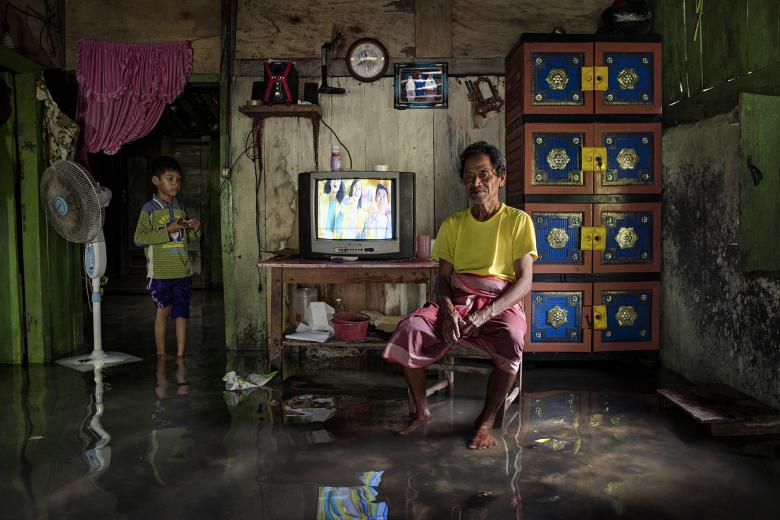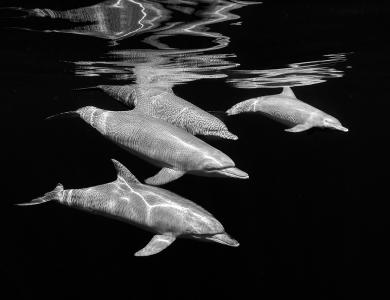Italian photojournalist Giacomo d'Orlando, who was awarded 3rd place in the 2022 Environment category, shares images from his new series Symbiosis on the World Photography Organisation Instagram from today to Monday. Follow the takeover here.

© Giacomo d'Orlando
What inspired you to be a photographer?
My inspiration comes from a desire that I’ve had since I was a child: to travel the world and tell stories that raise awareness about its beauty and the need to preserve it. I’ve always been fascinated by watching documentaries that explore remote areas, natural wonders and Indigenous cultures. When I was younger I hoped that one day I’d have the privilege to tell these types of stories through my own point of view.
What are your creative influences?
I've had several creative influences contributing to developing my practice in storytelling and photographic style. When I was a kid it was National Geographic and Jacques Cousteau’s documentaries – I watched those with my grandfather. I then found photography and painting exhibitions, as well as different types of art, that surrounded my daily life a key influence. Since I’ve become a professional documentary photographer, my biggest inspiration has been my friends and colleagues – I hold many of them in high esteem.
You’ve worked in several countries as a photojournalist, from Nepal to New Zealand. What inspired you to do so and how did you go about finding work abroad?
My biggest dream has been to discover the natural and cultural beauty of this world, so I put myself in certain situations to do just this. Working abroad is challenging and exciting: you're in a different place from where you are normally - this means a different culture, a different environment. Every time you need to push the reset button without forgetting what you have learnt from your previous experiences.
What’s the best piece of advice you’ve ever received about photography?
There isn’t just one piece of advice, there’s been a mixture, mostly from photo editors and colleagues. This includes the importance of developing my own point of view and telling a story I personally care about. The advice I would give to aspiring photographers is to be passionate and very determined when pursuing this career. It has to be your dream. When I started my photography career in 2011 it was as an unpaid assistant and I was doing different jobs to fund my personal projects - such as a farmer, delivery boy, chef, porter, shop assistant - the list goes on! So yes, I think determination is one of the most important qualities for an aspiring photographer to have.
What current projects are you working on?
In 2022 I started to work on my first long-term project called Symbiosis. I like the idea of dedicating years of my career to studying and developing a particular topic that’s internationally relevant and something I find stimulating.
My main goal is now to demonstrate the interconnection of climate change phenomena, focusing especially on marine and coastal ecosystems. With this project, I’d like to foster a proactive debate that will potentially lead to increasing solutions that help to preserve the environment. Through my work, I want to share the feelings of local communities who have seen drastic changes in their day-to-day lives, and how they and scientific researchers are working to find solutions to restore the ecosystem and secure future generations with a healthier environment. Over the next few years, with the intention of producing the next chapters of my project around the world, I hope to demonstrate that this is a challenge we need to fight together.
Your work is largely focused on the environment and potential solutions to challenges posed by climate change. How do you approach finding relevant topics and stories?
It's all about research and connections. Often when you look at the job of the documentary photographer from outside, most people think it's all about shooting cool subjects in a catchy way. In reality, or at least in my case, the major component of the documentary photographer's job is to do extensive research before approaching a story.
I usually spend months getting in touch with the right people and verifying the sources I have found on certain topics I'm interested in. In the case of Symbiosis, I approached scientists, researchers and NGOs who work in the field every day. I also believe that staying in a country for an extended period of time can give you access to local communities, gaining their confidence and allowing you to tell their stories.
As a photographer with a long list of prestigious accolades (including coming 3rd in the Environment category in 2022), what advice would you give to photographers entering the Sony World Photography Awards?
An interesting point of view I can share is to be as critical as you can be on your editing, and not to allow your feelings for a particular picture to cloud your judgment on a selection. Sometimes less is more. I have to say that before getting recognition through international awards, I have accumulated tons of rejections. So my second piece of advice is to keep trying!
What do you hope to achieve through your photography?
The role of photography and its power has changed through the years. Today we are so used to seeing pictures everywhere that we are diminishing the attention we pay to them. Sometimes we just look at them in passing, without really understanding their message. Still, a part of me believes that photography has the power to influence small positive changes in our society. In particular, I think that a positive approach is essential nowadays to stimulate the interest of the audience. My aim is to get people involved as much as possible, by giving my small contribution to move their consciousness and be more aware of environmental importance.



